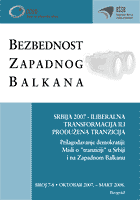PRIVREDNA TRANZICIJA U SRBIJI OD 2000. GODINE: TRENDOVI I MOGUĆNOSTI
ECONOMIC TRANSITION IN SERBIA SINCE 2000: TRENDS AND PROSPECTS
Author(s): Will BartlettSubject(s): Politics / Political Sciences
Published by: BCBP Beogradski centar za bezbednosnu politiku
Summary/Abstract: This paper presents recent developments in the Serbian economy and economic policy since 2000. The analysis is mainly descriptive, outlining recent trends, but also draws on the political economy of transition to assess the prospects for the continuation of liberalising economic reforms in the future. The dominant antireform coalition which blocked reforms under the Milošević regime was replaced in 2000 by a reformist coalition backed by the international financial institutions which pushed through significant structural reforms to the economy. Since then, a new antireform coalition has gained strength supported by interest groups who have benefited from partial reforms, and which seeks to stall further reforms. Economic change in Serbia can best be described as a protracted, rather than an illiberal, transition. But its continuation depends upon the political success of the pro-reform forces in the country.
Journal: Bezbednost Zapadnog Balkana
- Issue Year: 2007
- Issue No: 7-8
- Page Range: 56-64
- Page Count: 9
- Language: Serbian

